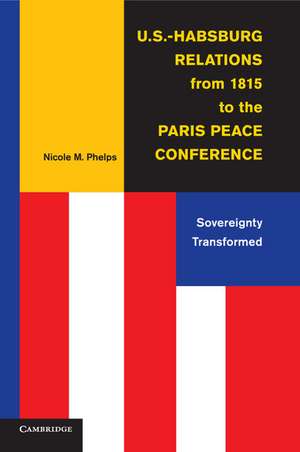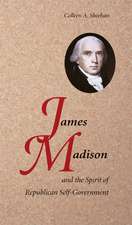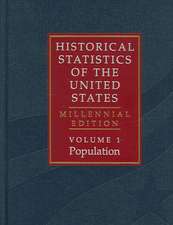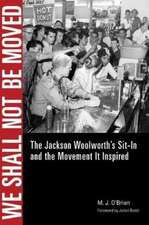U.S.-Habsburg Relations from 1815 to the Paris Peace Conference: Sovereignty Transformed
Autor Nicole M. Phelpsen Limba Engleză Paperback – 5 aug 2015
| Toate formatele și edițiile | Preț | Express |
|---|---|---|
| Paperback (1) | 269.86 lei 6-8 săpt. | |
| Cambridge University Press – 5 aug 2015 | 269.86 lei 6-8 săpt. | |
| Hardback (1) | 673.61 lei 6-8 săpt. | |
| Cambridge University Press – 11 aug 2013 | 673.61 lei 6-8 săpt. |
Preț: 269.86 lei
Nou
Puncte Express: 405
Preț estimativ în valută:
51.64€ • 53.72$ • 42.64£
51.64€ • 53.72$ • 42.64£
Carte tipărită la comandă
Livrare economică 14-28 aprilie
Preluare comenzi: 021 569.72.76
Specificații
ISBN-13: 9781107546349
ISBN-10: 1107546346
Pagini: 306
Ilustrații: black & white illustrations
Dimensiuni: 153 x 230 x 18 mm
Greutate: 0.45 kg
Editura: Cambridge University Press
Colecția Cambridge University Press
Locul publicării:New York, United States
ISBN-10: 1107546346
Pagini: 306
Ilustrații: black & white illustrations
Dimensiuni: 153 x 230 x 18 mm
Greutate: 0.45 kg
Editura: Cambridge University Press
Colecția Cambridge University Press
Locul publicării:New York, United States
Cuprins
Introduction: the Habsburg empire and the United States in transnational perspective; 1. Community and legitimacy: the diplomatic culture of the great power system; 2. Becoming a great power: US-Habsburg diplomatic relations and the integration of the United States into the great power system; 3. Protection and the problems of dual citizenship: US consuls in the Habsburg empire; 4. The limits of state-building: Habsburg consuls in the United States and the protection of lives and property; 5. Racial identity and political citizenship: American challenges to Habsburg sovereignty; 6. Giving up on Austria-Hungary: the end of the great power system and the shift to the nationalist successors; 7. Establishing sovereignty: the process of aligning race, place, and citizenship; Conclusion.
Recenzii
'This is a bilateral history that goes way beyond the traditional themes of diplomatic relations, tackling difficult issues of race and migration, racialist influences on Wilson's peacemaking strategy, and identity and changing notions of citizenship in the transatlantic transfer of migrants. Phelps's work marks a significant expansion of traditional notions of bilateral relations between nations and makes her a trailblazer in the field of 'new' diplomatic history going beyond politics into the popular arenas of gender and cultural studies.' Günter Bischof, University of New Orleans
'All similarities to old-fashioned diplomatic history end when reading this book on the well-worn topic of the Westphalian system of peace. Diplomats built new institutions that reflect their social activities; diplomacy sought territory and alliances. Yet all operated under the guise of forging a new racial identity for citizens within and outside of states. The ancient regime of the Hapsburgs, and the new powerhouse, the United States, vied for supremacy and, as Nicole Phelps brilliantly shows by untangling webs of politics and ideology, American racism triumphed over the diversity of old Europe. A fresh look at a traditional topic, Phelps succeeds with an original and sophisticated account of the long nineteenth century that shows how the next one hundred years - in all its volatility - took shape.' Thomas R. Zeiler, University of Colorado
'Nicole Phelps' innovative study recovers an overlooked relationship that offers a penetrating insight into the transformation of international governance and diplomatic protocol across the long 19th century. Her richly textured account of the United States-Habsburg relationship 'demonstrates the international and transnational aspects of the construction of sovereignty' … Both international and transnational in approach, Phelps' study is a highly calibrated examination worthy of a place on the shelves of European and American historians alike. This is a rare, non-Anglo-American account of the transatlantic transformation of international society between the end of the Napoleonic and First World Wars. Phelps unfolds a finely textured and detailed image of a tangled and complex interconnection that should prompt historians to reconsider the way in which the legitimacy of international order was asserted, reinforced, and eventually, dismantled.' Stephen Tuffnell, Reviews in History
'… highlights how US racism led not only to the mistreatment of Austro-Hungarian immigrants, but also to the delegitimization and ultimate dissolution of the mutliethnic Habsburg monarchy … Highly recommended. Upper-division undergraduates and above.' C. Ingrao, Choice
'Phelps provides a refreshing reminder that diplomacy during the nineteenth century mattered … [this is] an overdue introduction to the diplomatic interaction between the United States and the Habsburg Empire during the nineteenth century.' Niels Eichhorn, The Journal of American History
'This is an important book. The author has a broad and serious knowledge of the available historical documents, challenges their informative value, and offers new and alternative modes of interpretation. From the multitude of documents from various national archives in the US, as well as in Austria, Phelps develops a dense picture of conflicts over diplomatic norms concerning mostly the migration of several million people and of the crisis of the Great War itself. Especially convincing are the individual life stories of diplomas as well as of labour migrants and merchants gathered through various documents … her study is a significant contribution to transatlantic diplomatic history of the long nineteenth century, and can be highly recommended to scholars around the world who are interested in the many themes of American and European history that Phelps covers. An important topic of transatlantic history has finally received scholarly attention.' Annemarie Steidel, Austrian Studies Newsmagazine
'Nicole Phelps tells a fascinating story of US-Habsburg relations throughout the nineteenth and early twentieth centuries … [this is] a prime example of an innovative study in international history, one that, it is hoped, sets the stage for more original, archival-based research in the field of Austria's and Austria-Hungary's foreign relations.' Franz Adlgasser, Austrian History Yearbook
'All similarities to old-fashioned diplomatic history end when reading this book on the well-worn topic of the Westphalian system of peace. Diplomats built new institutions that reflect their social activities; diplomacy sought territory and alliances. Yet all operated under the guise of forging a new racial identity for citizens within and outside of states. The ancient regime of the Hapsburgs, and the new powerhouse, the United States, vied for supremacy and, as Nicole Phelps brilliantly shows by untangling webs of politics and ideology, American racism triumphed over the diversity of old Europe. A fresh look at a traditional topic, Phelps succeeds with an original and sophisticated account of the long nineteenth century that shows how the next one hundred years - in all its volatility - took shape.' Thomas R. Zeiler, University of Colorado
'Nicole Phelps' innovative study recovers an overlooked relationship that offers a penetrating insight into the transformation of international governance and diplomatic protocol across the long 19th century. Her richly textured account of the United States-Habsburg relationship 'demonstrates the international and transnational aspects of the construction of sovereignty' … Both international and transnational in approach, Phelps' study is a highly calibrated examination worthy of a place on the shelves of European and American historians alike. This is a rare, non-Anglo-American account of the transatlantic transformation of international society between the end of the Napoleonic and First World Wars. Phelps unfolds a finely textured and detailed image of a tangled and complex interconnection that should prompt historians to reconsider the way in which the legitimacy of international order was asserted, reinforced, and eventually, dismantled.' Stephen Tuffnell, Reviews in History
'… highlights how US racism led not only to the mistreatment of Austro-Hungarian immigrants, but also to the delegitimization and ultimate dissolution of the mutliethnic Habsburg monarchy … Highly recommended. Upper-division undergraduates and above.' C. Ingrao, Choice
'Phelps provides a refreshing reminder that diplomacy during the nineteenth century mattered … [this is] an overdue introduction to the diplomatic interaction between the United States and the Habsburg Empire during the nineteenth century.' Niels Eichhorn, The Journal of American History
'This is an important book. The author has a broad and serious knowledge of the available historical documents, challenges their informative value, and offers new and alternative modes of interpretation. From the multitude of documents from various national archives in the US, as well as in Austria, Phelps develops a dense picture of conflicts over diplomatic norms concerning mostly the migration of several million people and of the crisis of the Great War itself. Especially convincing are the individual life stories of diplomas as well as of labour migrants and merchants gathered through various documents … her study is a significant contribution to transatlantic diplomatic history of the long nineteenth century, and can be highly recommended to scholars around the world who are interested in the many themes of American and European history that Phelps covers. An important topic of transatlantic history has finally received scholarly attention.' Annemarie Steidel, Austrian Studies Newsmagazine
'Nicole Phelps tells a fascinating story of US-Habsburg relations throughout the nineteenth and early twentieth centuries … [this is] a prime example of an innovative study in international history, one that, it is hoped, sets the stage for more original, archival-based research in the field of Austria's and Austria-Hungary's foreign relations.' Franz Adlgasser, Austrian History Yearbook
Notă biografică
Descriere
This study chronicles US-Habsburg relations from the early nineteenth century through the aftermath of World War I.















